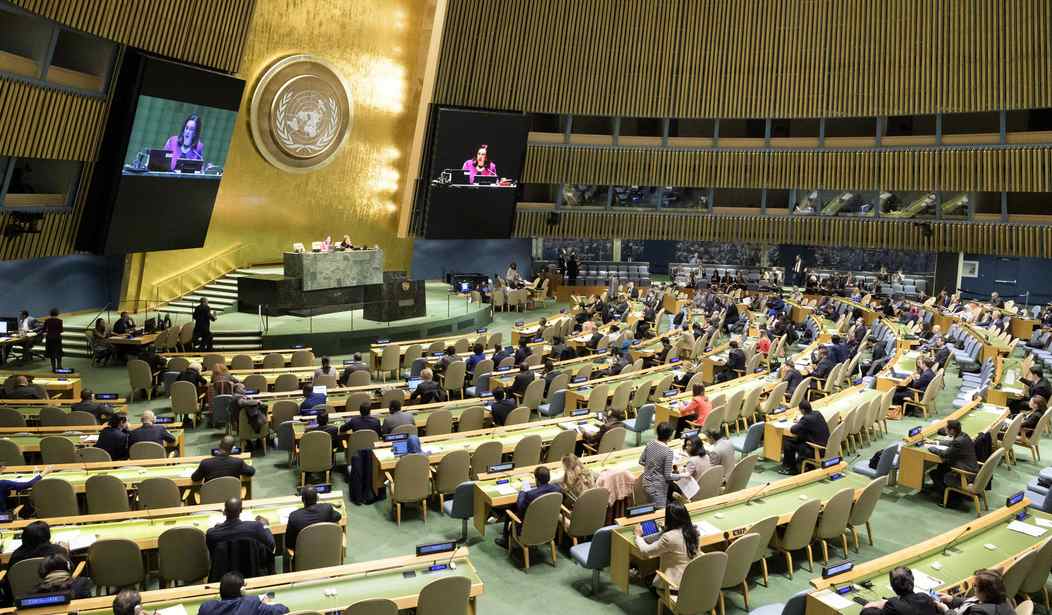Israel is increasingly standing alone on the global stage as it continues its eradication of Hamas, potentially leaving the United States in a similarly isolated position. That situation was on display at the United Nations yesterday, when the U.S. was forced to veto a resolution calling for an immediate ceasefire in Gaza. The measure was supported by nearly every other member of the Security Council, with Britain being the only other member not supporting it, and even they simply abstained. The final vote was 13 to 1 before the U.S. veto. Israel’s UN ambassador opposed the measure, obviously, but the symbolism behind the vote was clear. The public relations efforts in support of Hamas or at least the Palestinians in general have been effective, and many countries that initially supported Israel’s right to respond to the October 7 attacks are now backing away. (Associated Press)
The United States vetoed a United Nations resolution Friday backed by almost all other Security Council members and many other nations demanding an immediate cease-fire in Gaza, where Palestinian civilians are facing what the U.N. chief calls a “humanitarian nightmare.”
U.S. Deputy Ambassador Robert Wood criticized the council after the vote for its failure to condemn Hamas’ Oct. 7 attack on Israel in which the militants killed about 1,200 people, mostly civilians, or to acknowledge Israel’s right to defend itself. He declared that halting military action would allow Hamas to continue to rule Gaza and “only plant the seeds for the next war.”
“For that reason, while the United States strongly supports a durable peace, in which both Israelis and Palestinians can live in peace and security, we do not support calls for an immediate cease-fire,” Wood said.
The foreign ministers from Turkey, Saudi Arabia, and other Arab nations were in Washington while all of this was going on, attempting to pressure the Biden administration into supporting a call for a ceasefire. But their meeting with Tony Blinken didn’t take place until the vote at the UN had been cast and vetoed.
Interestingly, UN Secretary-General Antonio Guterres invoked Article 99 of the UN charter during the emergency meeting prior to the vote. That allows the head of the UN to raise concerns over “threats to international peace and security” and issue calls to action. H warned of a “total collapse of the humanitarian support system in Gaza.”
Most of the members of the Security Council are being careful not to excuse or approve of Hamas’ attacks on October 7, nor are they denying Israel the right to exist or defend itself. They are framing the debate in a way that argues that Israel’s response has been disproportionate and the damage to infrastructure and the deaths of non-combatants are unacceptable. This is a view that appears to be gaining traction, even among America’s allies.
Of course, even if we hadn’t vetoed it, United Nations resolutions carry no weight. The UN can’t force a ceasefire in Gaza any more than we can. Only Israel can make that decision and at least for the moment, they are insisting that the mission is not accomplished. But the war may not last much longer. They are currently flooding Hamas’ terror tunnels with seawater. That’s expected to take a few weeks, but when it’s done, Hamas will be almost unable to operate. Large numbers of Hamas fighters have been surrendering this week. At this rate, they soon won’t have enough fighters to mount any significant operations and they’ll be much easier to track on the surface.
At that point, Israel should be largely able to stop the shelling and shooting. If they return to regular humanitarian aid deliveries and the restoration of basic services, some sort of normal order might be established. Then all of the countries currently complaining about a ceasefire can get about their business. Or at least we can hope that’s how things work out in the short term. Whether or not Hamas figures out a way to rebuild and attack again remains to be seen.








Join the conversation as a VIP Member